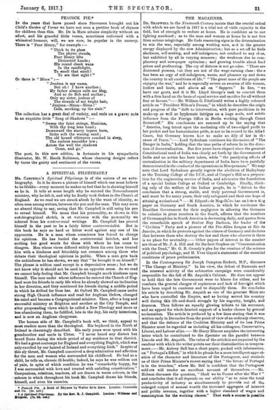A SPIRITUAL PII.GRIMAGE.t Mn. CAMPBELL'S Spiritual Pilgrimage is of the
nature of an auto- biography. In it he draws a picture of himself which one must believe to be lifelike—every moment he makes us feel that he is showing himself as he is. It tells at some length why he entered the Nonconformist ministry, why he left it, and why he finally took Orders in the Churea of England. As we read we are struck afresh by tho want of identity, so often seen among writers, between the pen and the man. This may seem an absurd thing to say, seeing that Mr. Campbell is still using his pen to reveal himself. We mean that his personality, 83 shown in this autobiographical sketch, is at variance with the personality We inferred from his controversial writings. Mr. Campbell has proved himself in the past to be a fairly bitter controversialist. But in this book he says no hard or bitter word against any one of his opponents. He is a man whom conscience has forced to change his opinions. He has buried the controversial hatchet, and has nothing but good words for those with whom he has come to disagree. Men whose views differed widely from his own have treated him with a kindness and friendship not common among those who debate their theological opinions in public. When a man gets bank the unkindness he has shown, we say that " he brought it on himself." The phrase is seldom used except in a depreciative sense ; but we do not know why it should not be used in an opposite sense. As we read we cannot help feeling that Mr. Campbell brought much kindness upon himself. The men under whose influence he entered the Church of Eng- land were his friends in early life when he already showed an inclination in her direction, and they continued his friends during a middle period in which he drifted far from her. At Oxford Mr. Campbell came under strong High Church influence and read for Anglican Orders, changed his mind and became a Congregational minister. Then, after a long and successful ministry at Brighton and another at the City Temple, and after propounding views which he called a New Theology and more or less abandoning them, he fulfilled, late in the day, his early intentions, and is now an Anglican clergyman.
The human side of Mr. Campbell's book will, we think, appeal to most readers more than the theological. His boyhood in the North of Ireland is charmingly described. His early years were spent with his grandmother and uncle in Ulster. " I never heard any dialect but broad Scots during the whole period of my residence in that district. We had a great contempt for England and everything English, which was only excelled by our hatred of Ireland and everything Irish." In spite of this sly thrust, Mr. Campbell conceived a deep admiration and affection for the men and women who surrounded his childhood. He had as a child, he tells us, chronic ill-health; indeed, he says he was seldom out of pain. in spite of which condition he was "remarkably happy, for I was surrounded with love and treated with unfailing consideration." Companions, relations, teachers, all are drawn in warm colours, in the - colours in which throughout his book Mr. Campbell draws his friends, himself, and even his enemies.
• Peaccek Pie. A Book of Rhymes by Walter de la mare. Laudon: Constable and CO. 15s. net.] A Spiritual Piigrimags. By the Bay. R. J. Campbell. Loudon : Williams sad Mordsts. 17s. dd. nett










































 Previous page
Previous page